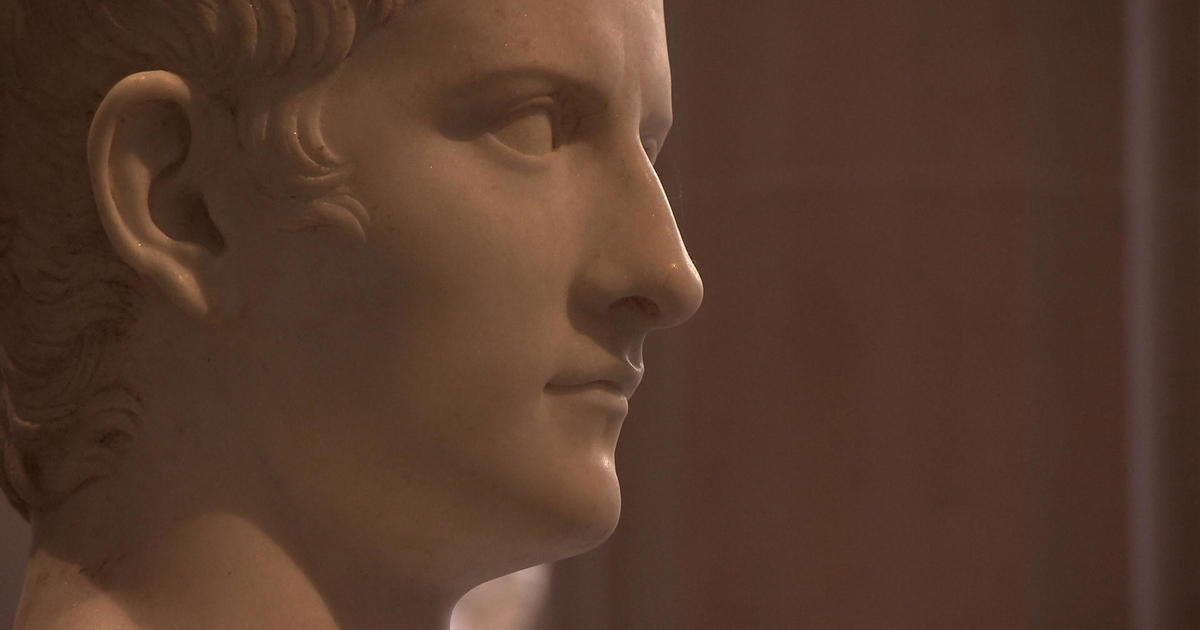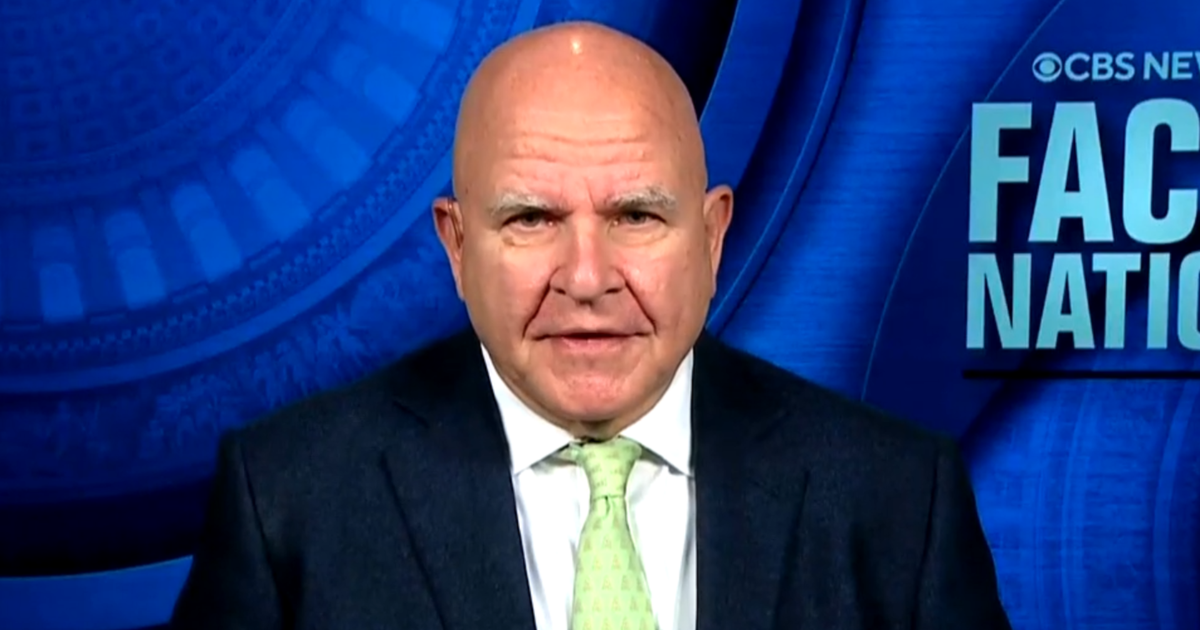CBS News
Searching for the truth in Emperor Caligula’s gardens in Rome – 60 Minutes

This is an updated version of a story first published on Nov. 21, 2021. The original video can be viewed here.
When workers broke ground on an underground parking lot in the heart of Rome eighteen years ago, they had no idea what their backhoes were about to unearth. The site turned out to be what Italian archeologists believe was once “the pleasure gardens” of the Roman emperor Caligula – where some 2,000 years ago all sorts of lavish parties, royal intrigue, and debauched behavior likely took place. Caligula became the third emperor of Rome in 37 AD, and he reigned for barely four years. He’s been portrayed as one of the most deranged and despicable Roman emperors ever to rule. But as we first reported in 2021, scholars have been re-examining Caligula’s story to see if history has it right. Could we discover some new fragments of truth in Caligula’s Gardens? Anderson Cooper went to Rome, to find out.
The temples and palaces of ancient Rome may have crumbled long ago, but the legend of one of its oddest emperors lives on.
What most people know about Caligula comes from this iconic BBC series “I, Claudius,” which was based on two historical novels by Robert Graves. In the show, Caligula turns his palace into a brothel, makes his horse a high-ranking senator and declares himself a living god.
It’s a torrid tale of incest, infanticide and imperial madness.
But how much of that portrayal is real?
Anderson Cooper: Did Caligula impregnate his sister and then eat her baby?
Andrew Wallace-Hadrill: Caligula did not impregnate his sister and eat her baby.
Anderson Cooper: Did Caligula make a horse a high-ranking senator or consul?
Andrew Wallace-Hadrill: No, no, of course he didn’t
Anderson Cooper: Did he turn his palace into a brothel?
Andrew Wallace-Hadrill: No.
Anderson Cooper: So where did all these ideas come from?
Andrew Wallace-Hadrill: Well, largely from Robert Graves, you know, his “I, Claudius” novels are awesome. But he wasn’t an academic. He was a writer.
Andrew Wallace-Hadrill is an academic — a professor emeritus at the University of Cambridge, and he’s closely studied the few written accounts that survive from Caligula’s time.
Anderson Cooper: I grew up watching “I, Claudius.” I loved the book. I love the old TV series. You’re telling me a lot of that just wasn’t true.
Andrew Wallace-Hadrill: Now, what I’m not denying is they had sex in the palace. Of course, they had sex. Pretty spectacularly, of course, they had sex.
Anderson Cooper: [laughs] Pretty spectacularly?
But Wallace-Hadrill does believe Caligula could be very impulsive and brutal, and he doesn’t rule out the possibility that he may have had a severe physical or mental disorder.
Andrew Wallace-Hadrill: I think there’s a serious danger that Caligula was pathological, that he actually didn’t care about the hurt he caused.
Wallace-Hadrill says Robert Graves’ novels were largely based on stories published around A.D. 121, 80 years after Caligula’s death by Suetonius, a well-known biographer and adviser to later emperors. But Suetonius often had to rely on second-hand stories and gossip from members of the imperial court.
Andrew Wallace-Hadrill: These members of the court, you know, it’s like staffers in the White House. It’s like all those leaky people in Buckingham Palace. What are these stories worth? How can you pin them down?
Archeology can help pin down the past, but in a city full of amazing ruins not much directly linked to Caligula had been discovered – that is until 2006.
When a pension fund for Italian doctors called Enpam started digging an underground parking garage for its new office building in the Esquilino neighborhood of Rome.
In ancient times this was one of a number of tranquil garden estates located about ten minutes by carriage from the bustling Roman forum. Recreations from Rome’s superintendent of antiquities give some sense of the sprawling grounds and buildings enjoyed by emperors and their guests for about four centuries.
It took archeologists nine years to carefully recover more than a million pieces of the past, while an underground parking garage and modern building was built around them.
Everything found was taken to a large warehouse, where it was closely analyzed, logged into a database and — when possible — painstakingly restored. The office building’s completed now and Rome’s newest archeological site, the Nympheum Museum, opened in the basement, preserving some of the excavation, and suggesting what a lush and lavish place this once was. It contains thousands of items from the 2nd century B.C. through the 5th century A.D., like this drinking glass that somehow survived largely intact for 1900 years.
Mirella Serlorenzi, director of excavations for the Italian Ministry of Culture, took us to a small staircase normally closed to the public and brought us to the level of the ground during Caligula’s time.
Anderson Cooper: And so back then in the First Century, 2,000 years ago this was outside?
Mirella Serlorenzi (Translation): It was clearly a garden because we found in the layers traces of the roots of the plants And in this part here, the staircase connected the various levels of the garden.
Anderson Cooper: Is it possible to walk on it?
Mirella Serlorenzi: Absolutely, yes.
Anderson Cooper: Yeah? Excellent.
We ended up talking for a long time on the garden steps.
Anderson Cooper: Is it alright to sit down?
There was something about touching those old slabs of marble that made ancient history feel very real.
Anderson Cooper: I can’t believe that we are sitting on the steps that Caligula may have walked on. It’s amazing.
She told us the water pipe by our feet was installed by Caligula’s successor, his uncle, Claudius, his name is stamped on the pipe.
One of the most remarkable things about Caligula is that he lived to become emperor at all. The emperor before him, his adoptive grandfather Tiberius, was suspected of killing Caligula’s father, mother, and two brothers. And when Caligula turned 19, he was summoned to live with Tiberius at his palace on the island of Capri.
It sits high on a cliff, and it’s said Tiberius would have people who crossed him tossed onto the rocks below. Through some combination of flattery and deceit, Caligula managed to survive here for six years with the man who may have killed much of his family. He became Tiberius’s successor in A.D. 37. He was just 24 years old and in charge of an empire.
Andrew Wallace-Hadrill: He was in a very, very difficult position. I like the saying of Tiberius who says, “Being emperor is like having to hold a wolf by the ears.” There’s this sorta savage beast that can turn on you any moment.
Anderson Cooper: What is so insecure about it? Was it the system itself?
Andrew Wallace-Hadrill: You’ve got this enormous concentration of power and resource, wealth, concentrated on the palace in Rome. And everyone wants in on it. They are prepared to do anything to seize this power.
Back then, the Roman Empire dominated the Mediterranean world. And items found in the gardens give some sense of the riches that flowed towards Rome. Rare and intricately-carved marble from the far reaches of the empire decorated the walls of the buildings. Glass recovered at the site appears to have been used in very early windows. And large amounts of oysters appear to have been served at meals. Mirella Serlorenzi says her team recovered the bones of wild animals that would have been brought here from far away lands. She showed us the leg of an ostrich, the foot of a lion and the tooth of a bear.
Mirella Serlorenzi (translation): It’s evident that wild animals were here for the entertainment of the emperor. Games were carried out here with gladiators, we can imagine, and battles with ferocious beasts.
When he became emperor, Caligula started improving Rome’s infrastructure, he began work on new aqueducts. He also cut taxes. Serlorenzi says this coin found in the gardens was minted around A.D. 39 to remind Romans that Caligula got rid of a sales tax.
Anderson Cooper: 2,000 years ago, politicians were just like politicians today: If they cut taxes, they wanted everybody to know about it.
Mirella Serlorenzi (translation): That’s exactly right. The coins are a form of imperial propaganda.
But something changed as the years progressed. Suetonius says Caligula wanted to be treated as a god and connected his palace in the Roman forum to a major temple.
Anderson Cooper: That’s the temple of castor and pollux?
Paolo Carafa: Exactly, exactly and this column has been standing there for more than 2,000 years
Anderson Cooper: That’s incredible
Paolo Carafa: They have been created in the year six.
Paolo Carafa, professor of archeology at Sapienza University of Rome, has been studying the Roman Forum area for more than 35 years.
Anderson Cooper: So according to Suetonius, Caligula extended his house up to that temple?
Paolo Carafa: Exactly
Anderson Cooper: Have you found evidence of that?
Paolo Carafa: Behind the temple, recent excavation have identified fragments of a large house, a luxury house.
He can’t say for sure it was Caligula’s house, but he says it comes from that time period, and only an emperor like Caligula would have dared do something so shocking.
Anderson Cooper: He wanted the temple to be the entrance to his–
Paolo Carafa: Exactly.
Anderson Cooper: –own house?
Paolo Carafa: Which is quite unusual.
One of the things “I, Claudius” seems to have gotten right, Wallace-Hadrill told us, was Caligula’s capacity for both physical and mental cruelty.
Andrew Wallace-Hadrill: There’s no doubt that Caligula’s brutal. But Suetonius says he’s not only brutal, he thinks it’s amusing. He takes pleasure in it.
Perhaps the most telling account comes from a contemporary of Caligula’s, the philosopher Seneca, who describes how Caligula invited a father to a festive dinner on the day he had executed the man’s son.
Andrew Wallace-Hadrill: And at the dinner, he insists that the father should have a jolly time. He plies him with wine and food. He even plies him with perfume and a garland.
Anderson Cooper: On the very day his son…
Andrew Wallace-Hadrill: On the very day. And Seneca says people asked how on earth could he endure to do it? And the answer is he had a second son. And I think that anecdote just evokes the atmosphere of terror of the court of Caligula.
As “I, Claudius” showed, the end came in A.D. 41 when Caligula was stabbed to death by members of his own imperial guard.
Andrew Wallace-Hadrill: He’s killed by his own guardsmen, but then they haven’t got a candidate.
Anderson Cooper: They don’t have somebody waiting to take over–
Andrew Wallace-Hadrill: They have no one in the wings, except poor old Claudius.
Anderson Cooper: Does that argue the point that he had to have been really awful if they were so motivated to just kill him?
Andrew Wallace-Hadrill: Yeah. Yeah. It’s an assassination born of anger, humiliation, disgust. “We can’t take this anymore.”
Long after the assassination itself, some historians believe, Caligula’s enemies assassinated his memory as well.
Anderson Cooper: There’s a number of contemporary scholars who have argued that Caligula’s critics distorted his memory, that they have falsely made him out to be far worse than he was.
Andrew Wallace-Hadrill: Of course. It’s like entering a hall of mirrors and you know some of them are concave, and some are convex. And there are no flat mirrors.
Anderson Cooper: But isn’t that terrifying that what we think we know about history is so dependent on rumors or…
Andrew Wallace-Hadrill: But I think it’s an enormous mistake to look at the past as a series of solid rocks that, you know, that was definitely there. And that was definitely. It’s a great morass, a flowing sea. I think that ancient history’s very good for people because it’s got so much uncertainty in it.
Anderson Cooper: But why is it good that there’s a lot of misinformation?
Andrew Wallace-Hadrill: It’s good because the world we live in is full of misinformation as we have learned spectacularly in recent years. You know? People invent truths. You have to be skeptical.
As we prepared to leave the Nympheum Museum, we couldn’t help thinking about how time tramples even the mightiest of empires, turning lavish gardens into underground parking lots.
Anderson Cooper: What do you think Caligula would think of– of what’s happened to his gardens?
Mirella Serlorenzi (translation): (laughs) I think he would be in total disagreement. And I don’t think he would be very happy that we are sitting on his staircase.
Produced by Andy Court. Associate producer, Evie Salomon. Broadcast associate, Annabelle Hanflig. Edited by Matthew Lev.
CBS News
Former Israeli hostages released in truce 1 year ago call for action to release those still held

Former Israeli hostages who were freed from Hamas captivity during a week-long humanitarian pause in fighting exactly one year ago Sunday called for immediate action to secure a deal for the release of those still held.
The only truce in the ongoing Israel-Hamas war on Nov. 24, 2023 – fewer than two months after fighting began – led to the release of 80 Israelis held by militants in Gaza. They were freed in exchange for 240 Palestinians detained in Israeli jails.
Repeated efforts since then by mediators from Qatar, Egypt and the United States to secure another truce and hostage release have failed. Qatar early this month said it was suspending its mediation role until the warring sides show “seriousness.”
Mostafa Alkharouf/Anadolu via Getty Images
Gabriella Leimberg was kidnapped during the Oct. 7, 2023, Hamas attack and was released along with her daughter, Mia, and sister Clara.
“For 53 days, the one thing that kept me going is that we, the people of Israel, the Jewish people, sanctify life — we don’t leave anyone behind,” she said.
Leimberg added: “Everything has already been said and now action is required. We don’t have any more time.”
Around 100 hostages are still in Gaza, and at least a third are believed to be dead.
“I survived and I was fortunate to get my entire family back,” Leimberg said. “I want and demand this for all the families of the hostages.”
Hamas wants Israel to end the war and withdraw all troops from Gaza. Israel has offered only to pause its offensive.
The Palestinian death toll from the war surpassed 44,000 this week, according to Gaza’s Health Ministry, which does not distinguish between civilians and combatants in its count.
Maya Alleruzzo / AP
Danielle Aloni, who was kidnapped with her five-year-old daughter, Emelia, and freed after 49 days, spoke at the ceremony of the “increasing danger” those still being held face every day.
She said those still in captivity “suffer physical, sexual, and psychological abuse, their identity and dignity crushed anew each day”.
“It took the Israeli government about two months to secure a deal for me and 80 other Israeli hostages. Why is it taking over a year to reach another deal to free them from this hell?” asked Aloni, whose brother-in-law, David Cunio, and his brother, Ariel Cunio, are still being held.
She emphasized that, even though she and the other hostages gained their freedom a year ago, “we haven’t really left the tunnels,” — referring to Hamas’ underground tunnels where many of the hostages were held.
“The feeling of suffocation, the terrible humidity, the stench — these sensations still envelop us,” Aloni said.
“If people could truly understand what it means to be held in subhuman conditions in tunnels, surrounded by terrorists for 54 days — there’s no way they would allow hostages to remain there for 415 days!” said Raz Ben Ami, who was released in the deal a year ago.
Her husband, Ohad, is still among those being held.
Ben Ami called for a ceasefire to “bring back all the hostages as quickly as possible”.
CBS News
Couple charged for allegedly stealing $1 million from Lululemon in convoluted retail theft scheme

A couple from Connecticut faces charges for allegedly taking part in an intricate retail theft operation targeting the apparel company Lululemon that may have amounted to $1 million worth of stolen items, according to a criminal complaint.
The couple, Jadion Anthony Richards, 44, and Akwele Nickeisha Lawes-Richards, 45, were arrested Nov. 14 in Woodbury, Minnesota, a suburb of Minneapolis-St. Paul. Richards and Lawes-Richards have been charged with one count each of organized retail theft, which is a felony, the Ramsey County Attorney’s Office said. They are from Danbury, Connecticut.
The alleged operation impacted Lululemon stores in multiple states, including Minnesota.
“Because of the outstanding work of the Roseville Police investigators — including their new Retail Crime Unit — as well as other law enforcement agencies, these individuals accused of this massive retail theft operation have been caught,” a spokesperson for the attorney’s office said in a statement on Nov. 18. “We will do everything in our power to hold these defendants accountable and continue to work with our law enforcement partners and retail merchants to put a stop to retail theft in our community.”
Both Richards and Lawes-Richards have posted bond as of Sunday and agreed to the terms of a court-ordered conditional release, according to the county attorney. For Richards, the court had set bail at $100,000 with conditional release, including weekly check-ins, or $600,000 with unconditional release. For Lawes-Richards, bail was set at $30,000 with conditional release and weekly check-ins or $200,000 with unconditional release. They are scheduled to appear again in court Dec. 16.
Prosecutors had asked for $1 million bond to be placed on each half of the couple, the attorney’s office said.
Richards and Lawes-Richards are accused by authorities of orchestrating a convoluted retail theft scheme that dates back to at least September. Their joint arrests came one day after the couple allegedly set off store alarms while trying to leave a Lululemon in Roseville, Minnesota, and an organized retail crime investigator, identified in charging documents by the initials R.P., recognized them.
The couple were allowed to leave the Roseville store. But the investigator later told an officer who responded to the incident that Richards and Lawes-Richards were seasoned shoplifters, who apparently stole close to $5,000 worth of Lululemon items just that day and were potentially “responsible for hundreds of thousands of dollars in loss to the store across the country,” according to the complaint. That number was eventually estimated by an investigator for the brand to be even higher, with the criminal complaint placing it at as much as $1 million.
Richards and Lawes-Richards allegedly involved other individuals in their shoplifting pursuits, but none were identified by name in the complaint. Authorities said they were able to successfully pull off the thefts by distracting store employees and later committing fraudulent returns with the stolen items at different Lululemon stores.
“Between October 29, 2024 and October 30, 2024, RP documented eight theft incidents in Colorado involving Richards and Lawes-Richards and an unidentified woman,” authorities wrote in the complaint, describing an example of how the operation would allegedly unfold.
“The group worked together using specific organized retail crime tactics such as blocking and distraction of associates to commit large thefts,” the complaint said. “They selected coats and jackets and held them up as if they were looking at them in a manner that blocked the view of staff and other guests while they selected and concealed items. They removed security sensors using a tool of some sort at multiple stores.”
CBS News contacted Lululemon for comment but did not receive an immediate reply.
CBS News
Former Trump national security adviser says next couple months are “really critical” for Ukraine

Washington — Lt. Gen. H.R. McMaster, a former national security adviser to Donald Trump, said Sunday that the upcoming months will be “really critical” in determining the “next phase” of the war in Ukraine as the president-elect is expected to work to force a negotiated settlement when he enters office.
McMaster, a CBS News contributor, said on “Face the Nation with Margaret Brennan” that Russia and Ukraine are both incentivized to make “as many gains on the battlefield as they can before the new Trump administration comes in” as the two countries seek leverage in negotiations.
With an eye toward strengthening Ukraine’s standing before President-elect Donald Trump returns to office in the new year, the Biden administration agreed in recent days to provide anti-personnel land mines for use, while lifting restrictions on Ukraine’s use of U.S.-made longer range missiles to strike within Russian territory. The moves come as Ukraine marked more than 1,000 days since Russia’s invasion in February 2022.
Meanwhile, many of Trump’s key selection for top posts in his administration — Rep. Mike Waltz for national security adviser and Sens. Marco Rubio for secretary of state and JD Vance for Vice President — haven’t been supportive of providing continued assistance to Ukraine, or have advocated for a negotiated end to the war.
CBS News
McMaster said the dynamic is “a real problem” and delivers a “psychological blow to the Ukrainians.”
“Ukrainians are struggling to generate the manpower that they need and to sustain their defensive efforts, and it’s important that they get the weapons they need and the training that they need, but also they have to have the confidence that they can prevail,” he said. “And any sort of messages that we might reduce our aid are quite damaging to them from a moral perspective.”
McMaster said he’s hopeful that Trump’s picks, and the president-elect himself, will “begin to see the quite obvious connections between the war in Ukraine and this axis of aggressors that are doing everything they can to tear down the existing international order.” He cited the North Korean soldiers fighting on European soil in the first major war in Europe since World War II, the efforts China is taking to “sustain Russia’s war-making machine,” and the drones and missiles Iran has provided as part of the broader picture.
“So I think what’s happened is so many people have taken such a myopic view of Ukraine, and they’ve misunderstood Putin’s intentions and how consequential the war is to our interests across the world,” McMaster said.
On Trump’s selections for top national security and defense posts, McMaster stressed the importance of the Senate’s advice and consent role in making sure “the best people are in those positions.”
McMaster outlined that based on his experience, Trump listens to advice and learns from those around him. And he argued that the nominees for director of national intelligence and defense secretary should be asked key questions like how they will “reconcile peace through strength,” and what they think “motivates, drives and constrains” Russian President Vladimir Putin.
Trump has tapped former Rep. Tulsi Gabbard to be director of national intelligence, who has been criticized for her views on Russia and other U.S. adversaries. McMaster said Sunday that Gabbard has a “fundamental misunderstanding” about what motivates Putin.
More broadly, McMaster said he “can’t understand” the Republicans who “tend to parrot Vladimir Putin’s talking points,” saying “they’ve got to disabuse themselves of this strange affection for Vladimir Putin.”
Meanwhile, when asked about Trump’s recent selection of Sebastian Gorka as senior director for counterterrorism and deputy assistant to the president, McMaster said he doesn’t think Gorka is a good person to advise the president-elect on national security. But he noted that “the president, others who are working with him, will probably determine that pretty quickly.”









